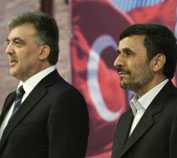Download Full Paper (PDF)
U.S.-Europe Analysis | Number 51
Iran and Turkey After Egypt: Time for Regional Realignments?
Iran, Turkey, Middle East Unrest, Middle East, Transatlantic Relations
Emiliano Alessandri, Former Visiting Fellow, Center on the United States and Europe
Ruth H. Santini, Visiting Fellow, Foreign Policy, Center on the United States and Europe
The Brookings Institution
Download Full Paper (PDF)
April 19, 2011 —
INTRODUCTION
 Both Iran and Turkey have a major stake in how the political landscape in North Africa and the Middle East is reshaped in the months ahead. Tehran and Ankara have developed their own separate narratives on regional events that take credit for providing the political inspiration for the Arab uprisings. Simultaneously, they have aimed to reinterpret reality on the ground to deflect attention away from their own domestic problems. While regional uprisings (with the possible exception of a resurgence of Kurdish separatism) do not necessarily threaten the stability of the Turkish state, Iran is experiencing its own waves of protests.
Both Iran and Turkey have a major stake in how the political landscape in North Africa and the Middle East is reshaped in the months ahead. Tehran and Ankara have developed their own separate narratives on regional events that take credit for providing the political inspiration for the Arab uprisings. Simultaneously, they have aimed to reinterpret reality on the ground to deflect attention away from their own domestic problems. While regional uprisings (with the possible exception of a resurgence of Kurdish separatism) do not necessarily threaten the stability of the Turkish state, Iran is experiencing its own waves of protests.
U.S.-Europe Analysis
Iranian President Mahmoud Ahmadinejad (R) and his Turkish counterpart Abdullah Gul attend an official meeting in Tehran February 14, 2011.
Iranian President Mahmoud Ahmadinejad (R) and his Turkish counterpart Abdullah Gul attend an official meeting in Tehran February 14, 2011.
As European and American leaders formulate policies toward North Africa and the Middle East, Iran and Turkey will have to be factored in and engaged in very different ways. This commentary offers a snapshot of Iranian and Turkish perceptions and reactions to the democratic protests in the Arab world, and explores ways in which the United States and the European Union might interact with Tehran and Ankara in channeling the currents of change.
In Iran’s initial public commentary on the first uprisings in Tunisia and Egypt, Iranian leaders portrayed the protests as “Islamic awakenings” inspired by Iran’s 1979 revolution. As events in Libya unfolded, the Iranian narrative shifted away from the protests to criticize the United States and its allies for staging a military intervention, and for being motivated—according to Iranian leaders—primarily by oil interests. Tehran’s narrative on Libya pointedly ignored United Nations Security Council (UNSC) resolution 1973, and the endorsement of the Arab League for the intervention.
Download Full Paper (PDF)
via Iran and Turkey After Egypt: Time for Regional Realignments? – Brookings Institution.

Leave a Reply